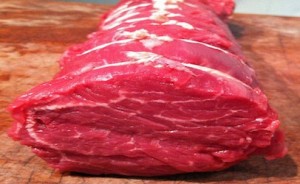The Federal Register today is publishing a new Country of Origin Labeling (COOL) rule written to bring the United States into compliance with World Trade Organization agreements. The new rule from USDA’s Agricultural Marketing Service modifies labeling requirements for muscle cuts of meat and amends the definition of what constitutes a “retailer.”  “Under this proposed rule, origin designations for muscle cut covered commodities derived from animals slaughtered in the United States would be required to specify the production steps of birth, raising, and slaughter of the animal from which the meat is derived that took place in each country listed on the origin designation,” AMS said. “In addition, this proposed rule would eliminate the allowances for any commingling of muscle cut covered commodities of different origins,” the agency statement continued. AMS began working on the rule change after the U.S. partially lost a WTO appeal in 2012 to rulings in challenges brought by Canada and Mexico. WTO’s appeal board found the U.S. Country of Origin Labeling requirements gave less favorable treatment to foreign cattle and hogs than to domestic livestock. The U.S. was given until May 2013 to bring its County of Origin Labeling rule into compliance with WTO. “There is overwhelming consumer support for country of origin labels and a growing interest by consumers in knowing the source of their food, the Washington D.C.-based consumer group Food & Water Watch said. “The USDA’s proposed rule will help families know where the meat in their supermarket came from,” F&WW added. “The proposed changes eliminate the vague and misleading ‘mixed origin’ country of origin label for meat and ensures that each cut of meat clearly displays each stage of production (where the animal was born, raised and slaughtered) on the label. This commonsense approach improves the usefulness of the information consumers receive from the label and allows livestock producers to distinguish their products in the marketplace.” But the National Cattlemen’s Beef Association disagreed, saying there is no regulatory fix that can be put in place to bring the current COOL rule into compliance with WTO obligations that will satisfy the U.S.’s top trading partners, Mexico and Canada. “The proposed amendments will only further hinder our trading relationships with our partners, raise the cost of beef for consumers and result in retaliatory tariffs being placed on our export products,” said Scott George, NCBA president. “The requirement that all products sold at retail be labeled with information noting the birth, raising and slaughter will place additional recordkeeping burdens on processors and retailers, contrary to the administration’s assertion. “Moreover,” George added, “this combined with the elimination of the ability to comingle muscle cuts, will only further add to the costs of processing non-US born, raised and slaughtered products.” In publishing the rule, AMS is allowing for a 30 day period for public comments.
“Under this proposed rule, origin designations for muscle cut covered commodities derived from animals slaughtered in the United States would be required to specify the production steps of birth, raising, and slaughter of the animal from which the meat is derived that took place in each country listed on the origin designation,” AMS said. “In addition, this proposed rule would eliminate the allowances for any commingling of muscle cut covered commodities of different origins,” the agency statement continued. AMS began working on the rule change after the U.S. partially lost a WTO appeal in 2012 to rulings in challenges brought by Canada and Mexico. WTO’s appeal board found the U.S. Country of Origin Labeling requirements gave less favorable treatment to foreign cattle and hogs than to domestic livestock. The U.S. was given until May 2013 to bring its County of Origin Labeling rule into compliance with WTO. “There is overwhelming consumer support for country of origin labels and a growing interest by consumers in knowing the source of their food, the Washington D.C.-based consumer group Food & Water Watch said. “The USDA’s proposed rule will help families know where the meat in their supermarket came from,” F&WW added. “The proposed changes eliminate the vague and misleading ‘mixed origin’ country of origin label for meat and ensures that each cut of meat clearly displays each stage of production (where the animal was born, raised and slaughtered) on the label. This commonsense approach improves the usefulness of the information consumers receive from the label and allows livestock producers to distinguish their products in the marketplace.” But the National Cattlemen’s Beef Association disagreed, saying there is no regulatory fix that can be put in place to bring the current COOL rule into compliance with WTO obligations that will satisfy the U.S.’s top trading partners, Mexico and Canada. “The proposed amendments will only further hinder our trading relationships with our partners, raise the cost of beef for consumers and result in retaliatory tariffs being placed on our export products,” said Scott George, NCBA president. “The requirement that all products sold at retail be labeled with information noting the birth, raising and slaughter will place additional recordkeeping burdens on processors and retailers, contrary to the administration’s assertion. “Moreover,” George added, “this combined with the elimination of the ability to comingle muscle cuts, will only further add to the costs of processing non-US born, raised and slaughtered products.” In publishing the rule, AMS is allowing for a 30 day period for public comments.
Sponsored by Marler Clark
